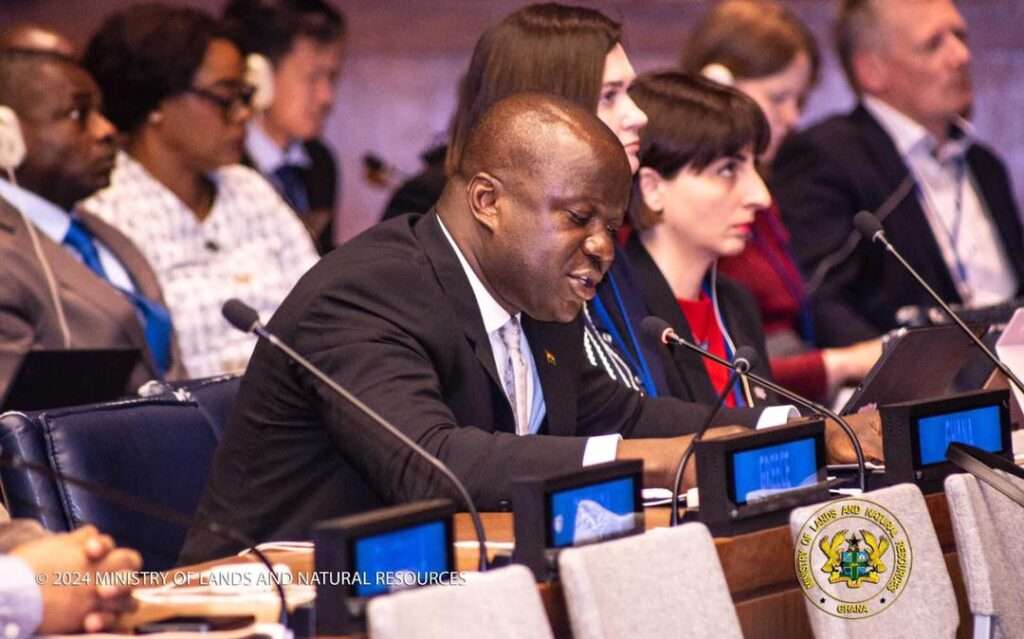In a powerful address at the Nineteenth Session of the United Nations Forum on Forests (UNFF19), the Minister for Lands and Natural Resources, Hon. Samuel A. Jinapor, MP, has underscored the critical need for increased financing for forest action to combat the intertwined crises of climate change, pollution, and biodiversity loss.
Speaking at the United Nations Headquarters in New York, Minister Jinapor emphasized the pivotal role of forests in mitigating these global challenges and the urgent necessity to explore and enhance forest financing mechanisms to drive investment towards achieving global forest, climate, and biodiversity goals.
Established in 2000, the UNFF is a functional commission of the United Nations Economic and Social Council (ECOSOC), dedicated to promoting the sustainable management, conservation, and development of all types of forests. Comprising all UN Member States, the Forum convenes annually to assess progress, adopt decisions, and make commitments towards its overarching goal.
The nineteenth session, which commenced on May 6, 2024, is conducting a mid-term review of the International Arrangements on Forests and focusing on “Forest-based solutions to the triple planetary crises: A focus on people, science, and technology.”
“Global leaders need to take urgent, concerted, and collaborative action to save the world’s forests, the planet, and the lives and livelihoods of the one point six billion (1.6 billion) people who depend on forest resources for survival. The leadership of President Akufo-Addo of Ghana has taken several initiatives aimed at forest protection and conservation, including the Ghana Forest Plantation Strategy, the Green Ghana Project, and the Ghana REDD+ Strategy.”
Hon. Samuel A. Jinapor, Minister for Lands and Natural Resources
Highlighting the alarming rate of global forest destruction despite growing awareness of environmental challenges, Minister Jinapor cited the World Resources Institute’s data, which revealed that tropical primary forest loss in 2023 amounted to 3.7 million hectares, contributing 2.4 gigatonnes of carbon dioxide emissions.

The Minister further emphasized the staggering annual cost of $393 billion to save the world’s forests, underscoring the urgent need for global leaders to act collaboratively and decisively to protect forests, the planet, and the livelihoods of the 1.6 billion people who depend on them.
The Minister also noted the significant financial challenges these countries face in forest protection and conservation, particularly due to the continuous default by developed countries on their pledges to support sustainable forest management.
Minister Jinapor called for a comprehensive program to incentivize local communities that depend on forests for their livelihoods, emphasizing the importance of forest conservation for global benefits. He questioned the inconsistency in carbon pricing across different regions, such as the difference between Europe and Africa, and called for a unified approach to pricing carbon to reflect its global impact.
As the UNFF19 draws to a close, it is poised to adopt a Declaration and resolutions geared towards promoting sustainable forest management. However, the efficacy of these measures hinges upon the collective will of nations to prioritize forest conservation and allocate the necessary resources to confront the existential challenges facing our planet.
In essence, Minister Jinapor’s clarion call serves as a poignant reminder that the fate of our forests is inextricably linked to the fate of humanity itself. Only through concerted global action and robust financing mechanisms can we hope to safeguard our forests, mitigate climate change, and secure a sustainable future for generations to come.
READ ALSO: Electoral Commission Responds to NDC’s Request for BVR Kit Serial Numbers























